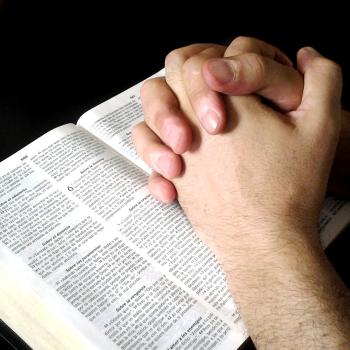In North America, Christians can be known by people outside the Church as much for their political positions as their theological ones.

Image via Pixabay
In America especially, right-wing evangelicals constitute a major voting demographic, and use this fact to seek to influence political powers to accomplish their goals.
So what exactly did Jesus and apostles have to say about secular government?
Short answer: Almost nothing.
So why do so many Christians spend so much time and energy investing in something that got such little attention from our Saviour and His foundation-laying servants?
The longer answer is more complicated, of course.
So here, a survey of Scripture. Although one could debate what exactly constitutes a “political” comment in the New Testament or not, here are the clearest things that Jesus and the apostles say about worldly politics and worldly government/kingdoms:
“Jesus is Lord/Jesus is King” (various places, e.g. Mt 12.8; Jn 21.7; Ac 10.36; Rom 10.9; Rev 19.16; etc)
Make no mistake: this is a political statement as much as a theological one. If Jesus is Lord, Caesar is not. No allegiance to any earthly ruler or kingdom can compare with the Christian’s allegiance to the Lordship of Jesus Christ.
19 But when John rebuked Herod the tetrarch because of his marriage to Herodias, his brother’s wife, and all the other evil things he had done, 20 Herod added this to them all: He locked John up in prison. (Lk 3.19-20)
Technically not Jesus or the apostles, but important to note from the life of John the Baptist: there is certainly a call to speak truth to political power, and to stand for righteousness, regardless of the consequences.
14 They came to him and said, “Teacher, we know that you are a man of integrity. You aren’t swayed by others, because you pay no attention to who they are; but you teach the way of God in accordance with the truth. Is it right to pay the imperial tax to Caesar or not? 15 Should we pay or shouldn’t we?”
But Jesus knew their hypocrisy. “Why are you trying to trap me?” he asked. “Bring me a denarius and let me look at it.” 16 They brought the coin, and he asked them, “Whose image is this? And whose inscription?”
“Caesar’s,” they replied.
17 Then Jesus said to them, “Give back to Caesar what is Caesar’s and to God what is God’s.”
And they were amazed at him. (Mk 12.15-17)
So the kingdom of this world is not the Kingdom of God; we owe certain things to our earthly kingdom, but not at the expense of the Kingdom of God. Also, pay your taxes.
Jesus, knowing that they intended to come and make him king by force, withdrew again to a mountain by himself. (Jn 6.15)
Here again, Jesus is not confusing His Kingdom or throne with any earthly kingdom or throne. They are not one and the same. He never sought to set up a political kingdom in the classic way.
36 Jesus said, “My kingdom is not of this world. If it were, my servants would fight to prevent my arrest by the Jewish leaders. But now my kingdom is from another place.”
37 “You are a king, then!” said Pilate.
Jesus answered, “You say that I am a king. In fact, the reason I was born and came into the world is to testify to the truth. Everyone on the side of truth listens to me.” (Jn 18.36-37)
The Kingdom of God is not like earthly kingdoms. Anabaptists would point to this passage to demonstrate that citizens of the Kingdom of God are not to participate in violence, since that is the way of the world, and the Kingdom is different than the world.
10 “Do you refuse to speak to me?” Pilate said. “Don’t you realize I have power either to free you or to crucify you?”
11 Jesus answered, “You would have no power over me if it were not given to you from above. (Jn 19.10-11)
All earthly authorities receive that authority from God alone. He is in charge ultimately, even, as in this case, when those authorities are about to murder you on a cross.
27 The apostles were brought in and made to appear before the Sanhedrin to be questioned by the high priest. 28 “We gave you strict orders not to teach in this name,” he said. “Yet you have filled Jerusalem with your teaching and are determined to make us guilty of this man’s blood.”
29 Peter and the other apostles replied: “We must obey God rather than human beings!” (Acts 5.27-29)
There are limits to when we will obey earthly authorities. In context, they were commanded not to talk about Jesus. When obedience to rulers calls us to disobedience to God, we choose obedience to God instead. This verse is not a catch-all for us to ignore rulers on things that we don’t like or agree with – we can only ignore them when their rules call us to disobedience to Christ.
“1Let everyone be subject to the governing authorities, for there is no authority except that which God has established. The authorities that exist have been established by God. 2 Consequently, whoever rebels against the authority is rebelling against what God has instituted, and those who do so will bring judgment on themselves. 3 For rulers hold no terror for those who do right, but for those who do wrong. Do you want to be free from fear of the one in authority? Then do what is right and you will be commended. 4 For the one in authority is God’s servant for your good. But if you do wrong, be afraid, for rulers do not bear the sword for no reason. They are God’s servants, agents of wrath to bring punishment on the wrongdoer. 5 Therefore, it is necessary to submit to the authorities, not only because of possible punishment but also as a matter of conscience.” (Rom 13.1-5)
Caesar is not Lord, but he is still the Lord’s servant, for our good. Submission to the secular authorities is our default position as believers. It is our general posture, as these authorities are appointed by God. One way we submit to God Himself is to submit to the rulers that He has set in place. To rebel against their rules is to rebel against God Himself, and will bring judgment upon us. As the previous passage taught, this submission does not apply when submitting would bring us into disobedience to God.
20 But our citizenship is in heaven. And we eagerly await a Savior from there, the Lord Jesus Christ, 21 who, by the power that enables him to bring everything under his control, will transform our lowly bodies so that they will be like his glorious body. (Phil 3.20)
Our earthly citizenship does not compare to our heavenly citizenship; Heaven is our top priority. If anything about our earthly citizenship calls us into conflict with the Kingdom of Heaven, we choose the Kingdom of Heaven.
15 The Son is the image of the invisible God, the firstborn over all creation. 16 For in him all things were created: things in heaven and on earth, visible and invisible, whether thrones or powers or rulers or authorities; all things have been created through him and for him. 17 He is before all things, and in him all things hold together. (Col 1.15-17)
A reminder that all things are created by Jesus, and are created for Him; the kingdoms of this world are for Him and His purposes.
I urge, then, first of all, that petitions, prayers, intercession and thanksgiving be made for all people— 2 for kings and all those in authority, that we may live peaceful and quiet lives in all godliness and holiness. (1Tim 2.1-2)
Prayer for everyone including our leaders is commanded, and we remind ourselves that the leaders of Paul’s day were often pagan leaders actively oppressing Christianity. “Thanksgiving” for them is even called for! Peaceful and quiet lives before the earthly rulers is the commandment. If we are compelled to not submit, it must be peaceful, godly and holy in our tactics.
1 Remind the people to be subject to rulers and authorities, to be obedient, to be ready to do whatever is good, 2 to slander no one, to be peaceable and considerate, and always to be gentle toward everyone. (Titus 3.1-2)
Continues the theme of submission and obedience as our default, unless there is biblical reason otherwise. Also, no slandering governing leaders that you disagree with!
13 Submit yourselves for the Lord’s sake to every human authority: whether to the emperor, as the supreme authority, 14 or to governors, who are sent by him to punish those who do wrong and to commend those who do right. 15 For it is God’s will that by doing good you should silence the ignorant talk of foolish people. 16 Live as free people, but do not use your freedom as a cover-up for evil; live as God’s slaves. 17 Show proper respect to everyone, love the family of believers, fear God, honor the emperor. (1Pet 2.13-17)
The ongoing theme of submission is here, but also the suggestion that our good action will silence the accusations against God’s people; by doing what is right, the rulers should notice us doing that and not be able to say anything against us. Honour even the pagan emperor opposed to Christianity. We don’t need to agree, and we may not always submit, but nonetheless we always walk in honour, as David did towards King Saul (1Sam 18-31).
“The kingdom of the world has become
the kingdom of our Lord and of his Messiah,
and he will reign for ever and ever.” (Rev 11.15)
One day, in the eschaton, the kingdoms of this world will fully submit to Jesus Christ in their entirety. We are not there yet, and they remain the kingdoms “of the world” until that time.
And that is it (again, there may be some debate about another verse or two that could be considered in this list, but I wanted to keep to the clearest ones).
Depending on the translation, there are around 185,000 words in the New Testament.
There are around 750-800 words listed here related to earthly governance.
That works out to about 0.4% of the New Testament talking about worldly politics.
Now, to be certain, this does not mean that matters of the Kingdom do not at times intersect with earthly kingdoms. The Church can and should be a voice for Kingdom matters, and should speak to the earthly rulers on them (e.g. Ac 24). We can use our citizenship rights for the sake of Kingdom, as Paul did (Ac 16.37-39; 25.11-12), and we can let our light shine everywhere (Mt 5.16), including in the political arena.
It should be noted that this needs to go on beyond just advocating for pro-life causes or personal religious freedoms, which get a lot of attention. It has been far less common for the Church to be a political voice for loving our enemies, being peacemakers, taking care of the poor, forgiveness, or other Kingdom values that Jesus clearly taught us.
This all means that our priority, by a vast, vast measure, is the Kingdom of Heaven.
It means that we pray a lot (even with thanksgiving!) for our political system and leaders.
It means that we do what they tell us to, even if we don’t like it, unless there is a clear and compelling biblical reason not to.
It means that we always remember that political power or a friendly government was never something that Jesus or the apostles needed to see God’s will done, and we do not need it either.
It means that we are a voice for the things that are important to Jesus, especially and including the vulnerable, the stranger, the “least of these.”
It means that if we don’t get our preferences in political matters, it literally does not matter at all to the Kingdom of God, which will never stop advancing and will never be beaten, even if every ruler and system of this world should turn against us.
********
If you’ve enjoyed what you read here, you can follow Third Way Christians on Facebook or Instagram, or sign up here to get new columns emailed directly to you! As well, you can track along with Chris’ Sunday morning teaching at Meadow Brook Church’s YouTube page!
















